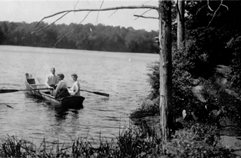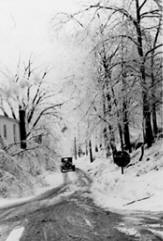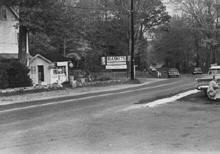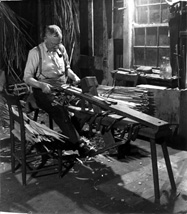| Pound Ridge is a small, country town in northern Westchester County with some 2,100 families.Country roads, winding through land with dramatic granite outcroppings and hundreds of streams, creeks and ponds, make it a picturesque and desirable place to live, visit and do business. |  Halle Ravine |
| Our beginnings date back to the 17th century. The southern portion of the town was part of a tract of land purchased by Captain Nathaniel Turner from local Indians of the Wappinnger Confederation in 1646.About 3,000 acres of northern Pound Ridge were included in a grant of land to Stephanus Van Cortlandt by William III in 1697. | |
 Farmers Picnic, Circa 1890 | The Farmers Picnic was held annually on the shores of Trinity Lake and offered music, games, speeches and all-around fun. It drew up to 2,000 people from the surrounding areas. |
| The name Pound Ridge is derived from an animal pound (a walled compound), that was situated in the oldest section of Pound Ridge, now known as “The Hamlet”. It was first used by local Siwanoy Indians to corral deer. Later, settlers in the 1700s used the pound to keep sheep, cows and pigs from roaming freely. | |
| Trinity Lake has been enjoyed over the years during all seasons. Boating on the lake has been a favorite pastime for many generations. |  Trinity Lake, Circa 1915 |
 Trinity Pass, Circa 1939 | Sometimes winters got a little heavy, a reminder of Pound Ridge’s resemblance to a charming New England town, a quality still found in its many historic houses and small-town warmth.Driving south on Trinity Pass, which was then a dirt road, in the winter. The first driver’s license in Westchester County was issued to a Pound Ridge resident. |
| In the late 19th century, a new road into Connecticut was constructed (today’s Westchester Avenue) and a business community developed at the intersection of Trinity Pass and Westchester Avenue. |  Westchester Avenue, Circa 1954 |
 Scofield’s Basket Shop, Circa 1954 | This area, known as “Basket Town,” became the hub of a thriving basket-making industry along with such cottage industries as shirt making and shoemaking. One basket factory employed almost 120 workers! One basket maker, who was blind, traveled by wagon from Basket Town with his assistant delivering his goods from Poughkeepsie to New Haven and beyond. |
